Financial Countries

How does financial regulation differ across countries ?
Financial regulation is the process by which governments and other regulatory bodies oversee and control the financial sector. The objective of financial regulation is to ensure the stability of the financial system, protect consumers, promote fair competition, and prevent financial crimes. However, the way financial regulation is implemented varies significantly across countries due to differences in economic structures, legal systems, political ideologies, and cultural values. The legal and institutional framework for financial regulation differs widely among countries. Some countries have a centralized regulatory body that oversees all aspects of the financial sector, while others have multiple regulators responsible for different segments of the market. Capital requirements and risk management practices also vary across countries. In general, developed countries tend to have stricter capital requirements and more sophisticated risk management practices than emerging markets. Consumer protection and disclosure requirements are another area where financial regulation differs across countries. In some countries, such as the United States, there is a strong emphasis on protecting investors from fraudulent activities and ensuring transparency in financial transactions. Taxation policies and anti-money laundering (AML) regulations also play a role in shaping financial regulation across countries. Tax havens, for example, attract foreign investment by offering low tax rates and minimal regulatory oversight, which can lead to concerns about money laundering and tax evasion. Cultural and societal factors can influence financial regulation in various ways. For instance, trust in government institutions and the rule of law tends to be higher in countries with stronger democratic traditions, which may lead to greater acceptance of regulatory interventions. Conversely, countries with weaker institutions or a history of corruption may face challenges in implementing effective financial regulation. Additionally, social preferences regarding income inequality, environmental sustainability, and other issues can shape the priorities of financial regulators in different countries.

What are the challenges faced by developing countries in emission reduction ?
Developing countries face numerous challenges in reducing their greenhouse gas emissions, including lack of financial resources, technological constraints, socio-economic factors, policy and regulatory challenges, cultural and educational barriers, and natural resource availability. These challenges highlight the complex nature of emission reduction efforts in developing countries and underscore the need for international cooperation, financial assistance, and technology transfer to support their transition to a low-carbon future.
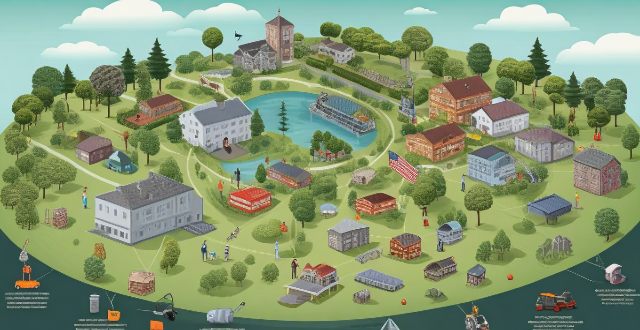
Is cryptocurrency legal in all countries ?
The legality of cryptocurrency varies across countries, withThe legality of cryptocurrency varies across countries, with it and others banning or The United States, Japan, and El Salvador are examples of countries where cryptocurrency is legal and regulated. In contrast, Algeria, Egypt, and Nepal have outright banned it due to concerns over financial stability and potential misuse in illegal activities. China, India, and Russia have imposed restrictions on its use but have not completely prohibited it. It is crucial to understand local laws and regulations before engaging in any cryptocurrency-related activities.

What role do developing countries play in climate governance ?
The article discusses the crucial role of developing countries in climate governance, highlighting their vulnerability to climate change, growing greenhouse gas emissions, active participation in international negotiations, innovation and technology transfer, financing and investment needs, and capacity building requirements. It emphasizes that developing countries are essential for achieving a successful outcome in the global fight against climate change.

How do countries measure their progress towards achieving climate goals ?
Countries measure their progress towards achieving climate goals through various indicators and metrics. These include Nationally Determined Contributions (NDCs), greenhouse gas inventories, renewable energy production, carbon intensity, forest cover and land use changes, climate finance flows, policy implementation, and public awareness and participation. By tracking these factors, countries can assess their performance in reducing emissions, adapting to climate impacts, and supporting global efforts to combat climate change.
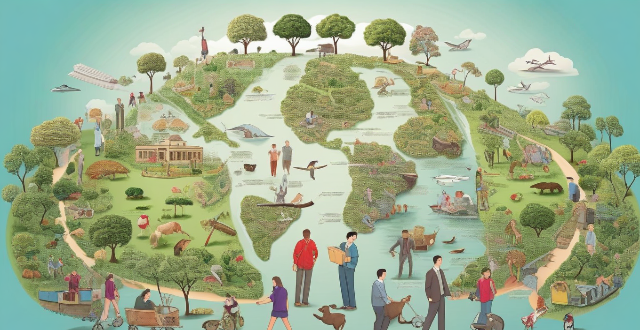
How do developing countries participate in international climate agreements ?
Developing countries play a crucial role in the global effort to combat climate change. Their participation in international climate agreements is essential for achieving a sustainable future for all nations. This article discusses how developing countries can engage with these agreements and contribute to global climate action by prioritizing education and awareness, seeking technical assistance, accessing financial and technological support, ensuring inclusivity and representation, building capacity through institutional strengthening and training programs, and engaging in collaboration and partnerships. By addressing these key points, developing countries can play a significant role in shaping global climate policy and contributing to a more sustainable future for our planet.

What role do developed countries play in achieving climate justice ?
The article discusses the role of developed countries in achieving climate justice. It outlines their historical responsibility, technological advantage, financial resources, and leadership in policy influence. Developed nations are responsible for a significant portion of greenhouse gas emissions due to early industrialization and higher per capita emissions. They also have the capability to drive innovation in clean energy technologies and facilitate technology transfer to less developed countries. Financial assistance through climate funds and green investments is essential for adaptation and mitigation efforts worldwide. Leadership in international agreements and stringent domestic policies set global benchmarks and encourage other nations to adopt cleaner practices. Overall, developed countries play a crucial role in bridging the gap between developed and developing nations and working towards a more equitable future for all.
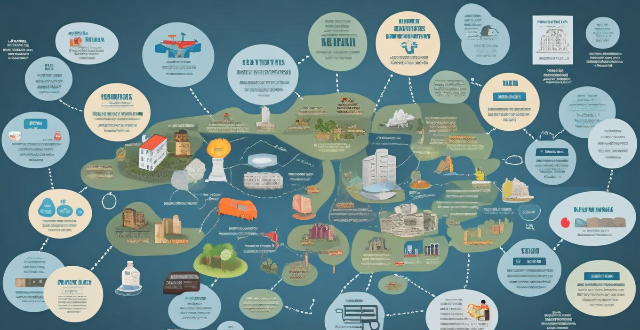
How do climate policies vary between developed and developing countries ?
This article compares the climate policies of developed and developing countries, highlighting differences in economic resources, technological capabilities, and political priorities. Developed countries have larger economies and more financial resources to invest in climate change initiatives, while developing countries face challenges due to limited financial resources. Technological capabilities also differ significantly, with developed countries possessing advanced technologies for renewable energy and emission reduction strategies, while developing countries lack such infrastructure. Political priorities also vary, with developed countries often prioritizing climate action, while developing countries may prioritize other pressing issues. The article concludes that international cooperation and support mechanisms are crucial for bridging these gaps and fostering a global response to climate change that is both equitable and effective.

How does Fintech impact financial inclusion ?
Fintech has revolutionized financial services, making them more accessible and affordable. It has increased accessibility for unbanked populations, lowered costs, improved efficiency, driven innovation, enhanced security, promoted financial literacy, facilitated inclusion initiatives, enabled digital identity verification, supported microfinance and crowdfunding, and promoted mobile money and payment systems. These advancements have significantly impacted financial inclusion worldwide.

Can developing countries meet the same climate commitments as developed ones ?
Climate change is a global challenge that requires collective action from all countries, regardless of their level of development. However, the question arises: can developing countries meet the same climate commitments as developed ones? This article discusses the differences in economic and technological capabilities, international support and collaboration, and national priorities and policy choices between developed and developing countries. While there are significant differences between the two groups of countries in terms of their ability to meet stringent climate commitments, international support and collaboration can help bridge these gaps. Additionally, national priorities and policy choices play a crucial role in determining whether developing countries can successfully implement climate actions while balancing other developmental goals.

How can countries with different levels of development cooperate on climate change issues ?
Climate change is a global challenge that requires the cooperation of all countries, regardless of their level of development. Here are some ways in which countries with different levels of development can work together on climate change issues: 1. **Sharing Technology and Knowledge**: Developed countries can share clean energy technologies with developing countries, while developing countries can share their indigenous knowledge about sustainable practices with developed countries. 2. **Joint Research and Development**: Countries can collaborate on research projects to develop new technologies and solutions for addressing climate change, and developed countries can provide training and capacity building programs to help developing countries build their scientific and technical capabilities. 3. **Financial Support and Investment**: Developed countries can provide financial assistance to developing countries to help them implement climate change mitigation and adaptation measures, and private sector investors from developed countries can invest in clean energy projects in developing countries. 4. **International Agreements and Cooperation**: Countries can work together under international climate agreements, such as the Paris Agreement, to set targets for reducing greenhouse gas emissions and adapting to the impacts of climate change, and developing countries can also cooperate with each other through South-South cooperation initiatives.

How can we balance the needs of developing countries with those of developed countries when it comes to climate action ?
This article explores strategies for balancing the needs of developing and developed countries in climate action. It discusses economic disparities, environmental impact, finance and technology transfer, capacity building, equitable emission reductions, adaptation support, collaborative research and innovation, and policy coherence as key factors to consider. The article emphasizes that achieving a balance requires recognizing the unique circumstances and needs of both types of countries and implementing strategies such as financial support, technology transfer, capacity building, equitable emission reductions, adaptation support, collaborative research, and policy coherence.

What is the impact of financial regulation on innovation in the financial sector ?
Financial regulation plays a critical role in the innovation landscape of the financial sector, with both positive and negative impacts. Positively, it promotes transparency and trust, encourages responsible innovation, and facilitates access to capital. However, it can also slow down the pace of innovation, restrict experimentation, and stifle international competitiveness. To mitigate these negative effects, adaptive regulation, collaborative approaches, and education and training are recommended. Striking a balance between fostering innovation and ensuring safety is crucial.

Can developed and developing countries achieve carbon neutrality at the same pace ?
The article discusses the challenges and potential solutions for developing countries to achieve carbon neutrality at the same pace as developed countries. The key differences between developed and developing countries in terms of economic development, technological advancements, and political will are highlighted. Developed countries have higher GDP per capita, more resources for research and development, and greater financial capacity to invest in renewable energy infrastructure. In contrast, developing countries have lower GDP per capita, limited resources for research and development, and less financial capacity to invest in renewable energy infrastructure. Technological advancements also play a crucial role in achieving carbon neutrality. Developed countries have advanced technology and innovation in clean energy sectors, access to cutting-edge research facilities, and well-established industries with experience in implementing sustainable practices. In contrast, developing countries have emerging technology and innovation in clean energy sectors, limited access to advanced research facilities, and infant industries with less experience in implementing sustainable practices. Political will is another factor that affects the pace of achieving carbon neutrality. Developed countries have stronger political commitment to addressing climate change through policy measures, more established regulatory frameworks for promoting renewable energy adoption, and greater public awareness and support for environmental issues. In contrast, developing countries have varying levels of political commitment to addressing climate change through policy measures, less established regulatory frameworks for promoting renewable energy adoption, and lower public awareness and support for environmental issues due to other pressing concerns such as poverty and healthcare. Developing countries face several challenges in achieving carbon neutrality, including lack of financial resources, technological barriers, and infrastructure challenges. Potential solutions for developing countries include international cooperation and funding, capacity building and education, and policy interventions and regulatory reforms. By working together through these solutions, both developed and developing countries can make significant progress towards a more sustainable future.

What is financial regulation ?
The text discusses the concept of financial regulation, which is a set of rules and guidelines that govern the operations of financial institutions. The primary objectives are to ensure stability and integrity of the financial system, promote fair dealing, protect consumers, and prevent financial crises. Key components include prudential regulation, market conduct regulation, consumer protection, systemic risk oversight, structural regulation, regulation of market infrastructure, and international coordination. Purposes of financial regulation are to ensure stability, promote transparency, protect consumers, facilitate efficiency, and prevent criminal activity. Methods of financial regulation include rulemaking, supervision, inspection, capital requirements, and liquidity requirements. Challenges in financial regulation include balancing oversight with innovation, keeping pace with technology, and international coordination.

What challenges do countries face when trying to achieve climate cooperation ?
**Challenges in Achieving Climate Cooperation:** Countries face numerous challenges when trying to cooperate on climate issues due to diverse national interests, unequal responsibility and capacity, economic implications of climate policies, geopolitical tensions, scientific uncertainty and skepticism, and institutional barriers. These factors can lead to disagreements about who should bear the burden of reducing emissions and how much financial and technical support should be provided to less capable nations. By understanding these challenges, countries can work together to find solutions that balance national interests with the global imperative of combating climate change.

What is the role of international organizations in financial regulation ?
International organizations are crucial in financial regulation, promoting stability, cooperation, and coordination among countries. They set global standards, enhance coordination, provide policy advice, facilitate information exchange, and monitor market developments. The Basel Committee on Banking Supervision, International Organization of Securities Commissions, and International Association of Insurance Supervisors develop regulatory standards for banks, securities regulators, and insurance, respectively. The Financial Stability Board coordinates international financial regulation, while the Bank for International Settlements facilitates cooperation among central banks. The World Bank and IMF offer technical assistance and support for financial sector development and reform. The Committee on Payment and Settlement Systems promotes payment system stability, and the Joint Forum of Tax Administrations addresses tax evasion. The Global Financial Stability Report and Early Warning Exercises monitor market developments and emerging risks. Overall, these organizations help ensure financial stability, reduce systemic risks, and foster a more transparent and resilient global financial system.
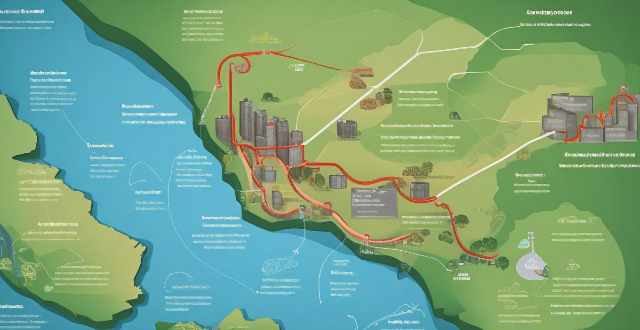
How do developed and developing countries differ in their stance on climate change negotiations ?
The article discusses the differences in stance on climate change negotiations between developed and developing countries. Developed countries view climate change as an urgent issue that requires immediate action and are willing to take steps to reduce their carbon footprint, including investing in renewable energy sources and sustainable practices. They also acknowledge their historical responsibility for contributing to greenhouse gas emissions and are financially capable of investing in climate change initiatives. On the other hand, developing countries prioritize economic growth and development over immediate climate action and emphasize the importance of fairness and equity in negotiations. They focus on adapting to the impacts of climate change and building resilience against its effects, seeking financial support from developed nations to help them transition to low-carbon economies and implement adaptation measures. The article concludes that finding common ground between these differing perspectives will be crucial for effective global cooperation in addressing climate change challenges.

How are countries working together to combat climate change ?
The text discusses the various international initiatives and agreements aimed at combating climate change, emphasizing the importance of global collaboration in addressing this complex issue. Key points include: 1. **International Agreements** such as the UNFCCC, Kyoto Protocol, and Paris Agreement set the framework for countries to commit to reducing greenhouse gas emissions and limiting global warming. 2. **Multilateral Cooperation** platforms like the Global Green Growth Forum and Clean Energy Ministerial focus on sharing knowledge and promoting sustainable practices. 3. **Financial and Technical Support** mechanisms, including the Green Climate Fund and Adaptation Fund, provide resources for developing countries to tackle climate change effectively. 4. **Research and Development** organizations, including the IEA and IPCC, offer scientific assessments and energy strategies to guide policy decisions. 5. **Education and Public Awareness** programs aim to integrate climate change education into global curricula and raise public awareness about its implications. 6. **Mitigation and Adaptation Strategies**, such as Nationally Appropriate Mitigation Actions (NAMAs) and Integrated Coastal Zone Management (ICZM), help countries adapt to and reduce the impacts of climate change. These efforts underscore the collective action required from nations worldwide to mitigate and adapt to the challenges posed by climate change, ultimately working toward a more sustainable future.

How do carbon credit systems impact developing countries ?
Carbon credit systems can have both positive and negative impacts on developing countries, including economic development, environmental benefits, technology transfer, market risks, social impacts, and environmental concerns. Policymakers and stakeholders must carefully consider these impacts when designing and implementing carbon credit projects in developing countries.

Can developing countries skip traditional energy sources and go straight to renewables ?
The article discusses the feasibility of developing countries transitioning directly to renewable energy sources, bypassing traditional energy sources. It examines economic, technological, political, and environmental considerations in detail. While there are challenges associated with transitioning to renewable energy, developing countries can certainly skip traditional energy sources and go straight to renewables if they receive adequate financial, technological, and political support. The benefits of doing so include job creation, reduced carbon emissions, and improved local air quality.
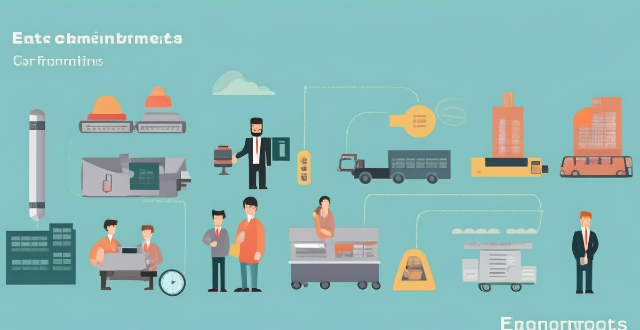
Can carbon credits be a sustainable source of income for developing countries ?
The article explores the potential of carbon credits as a sustainable source of income for developing countries, highlighting their benefits in revenue generation, sustainable development, and international cooperation. However, it also underscores the challenges such as market volatility, implementation complexities, and ensuring environmental integrity. The conclusion emphasizes that with robust frameworks and transparent monitoring, carbon credits can be a cornerstone of sustainable development strategies for developing countries.

What role do developing countries play in the Paris Climate Agreement ?
The Paris Climate Agreement, adopted in 2015, is a global response to the urgent need for action on climate change. It represents a significant step forward in international efforts to mitigate the effects of climate change and adapt to its impacts. Developing countries play a crucial role in this agreement, as they are disproportionately affected by climate change and have unique challenges and opportunities in addressing it. Key Points: - Many developing countries are located in regions that are particularly vulnerable to the impacts of climate change, making their participation essential for building resilience and adaptive capacity. - Developing countries have significant potential for mitigating greenhouse gas emissions through sustainable development pathways, renewable energy deployment, and forestry activities, which are vital for achieving the long-term temperature goals set out in the agreement. - The Paris Agreement recognizes the need for developed countries to provide financial and technological support to help developing countries implement their climate actions, which is crucial for enabling these countries to build low-carbon, climate-resilient economies. - Under the Paris Agreement, each country submits National Determined Contributions (NDCs), which outline their planned contributions to mitigating climate change and adapting to its impacts. Developing countries have submitted a wide range of NDCs, reflecting their diverse circumstances and priorities. - The Paris Agreement acknowledges the need to address loss and damage associated with the impacts of climate change in developing countries, particularly in vulnerable communities. This includes both slow-onset changes and sudden-onset events, such as floods and droughts. - The agreement emphasizes the importance of capacity building for developing countries to enhance their ability to implement climate actions effectively, including improving institutional arrangements, strengthening technical expertise, and fostering knowledge sharing. In conclusion, developing countries are integral participants in the Paris Climate Agreement, bringing unique perspectives, challenges, and opportunities to the global effort to combat climate change. Their active engagement is critical for achieving the goals of the agreement and ensuring a more equitable and sustainable future for all.

How do developing countries benefit from the Clean Development Mechanism (CDM) ?
How Developing Countries Benefit from the Clean Development Mechanism (CDM) The Clean Development Mechanism (CDM) of the Kyoto Protocol brings numerous benefits to developing countries, including technology transfer, sustainable development, and environmental advantages. It also enhances their capacity building, global engagement, and influences policy-making towards sustainability. Overall, the CDM aids in reducing emissions while fostering economic growth and environmental conservation.

How do issues like doping scandals affect the reputation of countries in international sports ?
Doping scandals have a negative impact on the reputation of countries in international sports, including loss of credibility, negative media coverage, reduced participation in international competitions, financial consequences, and damage to athlete reputations.

What role do international aid and foreign investments play in the economic growth of low-income countries ?
The text discusses the crucial role of international aid and foreign investments in promoting economic growth in low-income countries. It highlights how these two factors contribute to development by providing financial resources, technical expertise, and market access. The text also emphasizes the need for effective and transparent use of these resources to maximize their impact on sustainable economic growth.

Can blockchain technology revolutionize the financial industry ?
Blockchain technology has the potential to revolutionize the financial industry by introducing a decentralized, transparent, and secure way of conducting transactions. In this article, we will explore how blockchain technology can transform the financial sector and discuss its benefits and challenges. Benefits of Blockchain in Finance: - Decentralization: Elimination of intermediaries and increased efficiency. - Transparency: Immutable records and audit trail for regulatory compliance. - Security: Distributed ledger and cryptography ensure secure transactions. Challenges of Blockchain in Finance: - Regulatory uncertainty: Lack of clear regulations and compliance issues. - Scalability: Limited throughput and ongoing research for scaling solutions. - Interoperability: Integration with legacy systems and lack of standardization. Potential Use Cases for Blockchain in Finance: - Payments and Remittances: Faster and cheaper cross-border transactions. - Trade Finance: Streamlined processes and automated smart contracts. - Securities Settlement: Real-time settlement and fractional ownership of assets. In conclusion, blockchain technology has the potential to revolutionize the financial industry by introducing a decentralized, transparent, and secure way of conducting transactions. While there are challenges to overcome, such as regulatory uncertainty, scalability concerns, and interoperability issues, the benefits of blockchain in finance are undeniable. As the technology continues to evolve and mature, we can expect to see increased adoption and innovation in the financial sector powered by blockchain technology.

What role do developing countries play in climate summit discussions ?
Developing countries play a significant role in climate summit discussions by contributing to mitigation efforts, adaptation strategies, and technology transfer. However, they face challenges such as limited resources, unequal responsibility, and lack of representation. It is crucial to recognize and address these challenges to ensure that developing countries are adequately represented and supported in climate negotiations.

What challenges do developing countries face in adopting renewable energy policies ?
Developing countries face numerous challenges in adopting renewable energy policies, including lack of infrastructure and technology, high costs and limited financing options, inadequate legal and regulatory frameworks, limited human resources and capacity building, social and cultural barriers, and environmental concerns and sustainability challenges. These challenges must be addressed to effectively implement and maintain renewable energy projects in these countries.
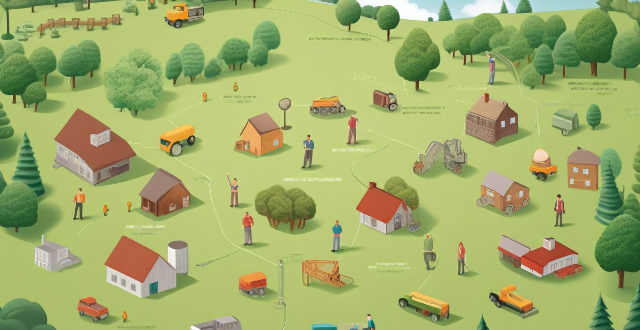
How do economic indicators differ between developed and developing countries ?
Economic indicators reflect the health and performance of a country's economy, with significant differences between developed and developing countries. Developed countries typically have higher GDP and GDP per capita values, lower inflation rates, more robust social safety nets, and attract high levels of foreign direct investment (FDI). They also score high on the Human Development Index (HDI), have more balanced trade positions, and while income inequality exists, there are often stronger welfare systems to mitigate its effects. On the other hand, developing countries often have lower GDP and GDP per capita, higher inflation rates, less developed social safety nets, and receive less FDI due to perceived risks. They also tend to have lower HDI scores, struggle with trade deficits, and face more pronounced income inequality. However, it is important to note that each country is unique and may exhibit characteristics that do not strictly align with typical developed or developing country traits. Economic indicators should always be considered within the context of a country's specific circumstances.